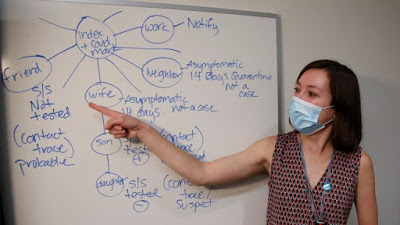Virginia Health Department battles COVID spread with contact tracers and phone apps
 |
| A training session for contact tracers in Salt Lake City. [Rick Bowmer /AP] |
The Virginia Department of Health (VDH) is stepping up its monitoring of COVID-19 cases by using human contacts combined with technology.
VDH is hiring 1,300 contact tracers and launching a new app for smart phones. Virginia is spending $58 million in federal CARES Act funds on these efforts.
The proximity app, which will tell uses if they’ve been near someone who tests positive for COVID, is expected to be released within a few weeks, VDH officials said during a conference call May 22. It will use technology created by Google and Apple.
To ensure privacy, the app will allow people to opt in or opt out, said Mona Bector, deputy commissioner of administration at VDH. The data collected will be on a secure cloud-based system.
Virginia released COVIDCheck, an artificial intelligence-based app that helps people check their symptoms, tell them if they come in contact with an infected person, refer them for a telemedicine or doctor visit, and guide them to stay home or self-isolate.
As of May 22, VDH reported a total of 34,950 COVID cases, 4,145 hospitalizations, and 1,136 deaths. A large proportion of cases are concentrated in Northern Virginia.
The Fairfax Health District experienced a big one-day jump in cases – 423 on May 21 – after case numbers had leveled off for a few days. Dr. Benjamin Schwartz, director of epidemiology at the Fairfax County Health Department, said the big increase could be attributed to labs releasing results in batches on the same day.
The Fairfax Health District reports a total of 8,734 cases, 1,181 hospitalizations, and 321 deaths.
Contact tracing is a “fundamental component of public health” and is “really critical to eliminate COVID in Virginia,” says epidemiologist Marshal Vogt. Contact tracing lets the agency know how the disease is spreading and where it is coming back.
Contract tracers reach out to people infected with COVID and ask them where they’d been and who they’d been in contact with, Vogt says. They then contact those people and urge them to self-quarantine, check in with them regularly, see if they develop symptoms, and see if they need other help, such as getting groceries.
The 1,300 people to be hired include contact tracers, regional advisers, case investigators, data managers, analysts, and supervisors. VDH expects many of these people will start next week, and the system will be at full capacity within a few weeks. The agency already received over 6,000 resumes. Applications can be submitted here.
Contact tracers should have good communication skills and be able to empathize and build trust with people. The VDH is looking for a diverse workforce and people who can work in their own communities. People with bilingual skills are in demand. Case investigators should have a background in public health.
The new people will be trained on using contact tracing technology, entering and managing data, and protecting people’s privacy, Vogt says. Tracers will call people on the phone and sometimes knock on doors as needed. They will be given scrips and PPE.
If people refuse to self-quarantine, staff would attempt to build trust and emphasize the importance of stopping the spread of the disease, Vogt says. If they still refuse, the health commissioner could issue an order that would be enforceable, although that is expected to be necessary only in rare cases.

